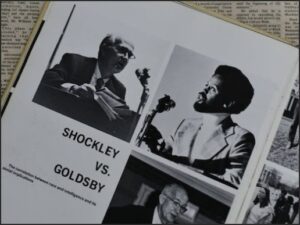by James A. Bacon
The attacks on Bert Ellis, newly appointed member of the University of Virginia Board of Visitors, continue without letup. The Cavalier Daily, the UVa student newspaper, has published an article resurrecting an event from the 1974-75 academic year in which Ellis, who led the University Union at the time, invited IQ theorist and eugenicist William Shockley to speak at the university.
The article follows a call by Student Council for Ellis’ resignation from the Board of Visitors for the offense in 2020 of thinking about using a razor blade to remove the infamous “F— UVA” sign from the door of a room on the Lawn.
The CD piece does not call Ellis a racist outright, but it invites readers to draw such a conclusion by recounting how he was instrumental in bringing a prominent racist to the university despite the vehement opposition of some African-American students.
What the CD article overlooks is that Shockley, who won the Nobel Prize for his contributions to the invention of the transistor, was giving numerous speeches and garnering widespread media attention at the time for his view that Blacks are genetically inferior to Whites. It also neglected to report that the Student Union also recruited Richard Goldsby, an African-American biologist who argued that race is a social construct, to debate Shockley.
“We wanted the issues thrashed out,” says Ellis. “It was a true debate that was a sold out event. Richard Goldsby took him to task.”
To hold such a debate today would be considered beyond the pale. But the debate made a positive contribution to the discrediting of racism at the time. Many Whites still believed in Black genetic inferiority in the mid-1970s, and Shockley gave their prejudices an intellectual gloss. Those views also were under increasing attack. Harvard, Princeton and Yale had canceled Shockley appearances in response to student outrage, but such intolerance only make him a martyr in the minds of many. Shutting down a speaker might silence him for the moment but it does nothing to refute his views. By contrast, the UVa Student Union event gave Goldsby an opportunity to demolish Shockley in a mano a mano debate.
UVa was a much more intellectually vibrant place in the mid-1970s than it is today, when people whose views conflict with the reigning orthodoxies are scolded and bullied into silence. During Ellis’ tenure at the Student Union, UVa hosted the first public speech by John Dean after he pleaded guilty to obstruction of justice in the Watergate controversy and turned government witness against President Richard Nixon. The Student Union also hosted the first public viewings and analysis of the entire Zapruder film of the Kennedy assassination.
“We had some real major events back then,” says Ellis. “Students paid real money to go to them, and the events were packed.”
That’s certainly more than can be said today when the only controversial speakers, such as former Vice President Mike Pence, are paid for by outside organizations like The Jefferson Council (of which Ellis is president) and the Young America’s Foundation. True to form, The Cavalier Daily denounced Pence’s appearance, too.
One might hope that the thought police at The Cavalier Daily and in Student Council might ponder how racist ideas were discredited in the first place. If their predecessors at UVa had adopted the same approach, they would have shut down those who challenged the old racist dogmas. One wishes that these passionate but misguided students will come to understand that they hold the views they do only because others had the freedom to speak about them, write about them, and defend them publicly.
Bert Ellis championed freedom and diversity of thought as a 4th-year student in 1975, and he does so today. As a member of the Board of Visitors, he will continue to fight for free expression and intellectual diversity.
The editors of The Cavalier Daily could earn a modicum of respect by challenging Ellis’ ideas directly. But delving more than 40 years into the past for a controversial event and omitting critical context to tar him through guilt by association with a now-discredited racist does nothing to advance any worthy cause. The CD article discredits only itself.
Full disclosure: The author is vice president-communications of The Jefferson Council.



